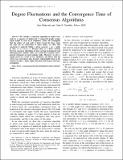Degree Fluctuations and the Convergence Time of Consensus Algorithms
Author(s)
Olshevsky, Alex; Tsitsiklis, John N
DownloadAccepted version (558.6Kb)
Terms of use
Metadata
Show full item recordAbstract
We consider a consensus algorithm in which every nodein a sequence of undirected, B-connected graphs assigns equal weight to each of its neighbors. Under the assumption that the degree of each node is fixed (except for times when the node has no connections to other nodes), we show that consensus is achieved within a given accuracy on nodes in time B+4n3In(2n/ε). Because there is a direct relation between consensus algorithms in time-varying environments and in homogeneous random walks, our result also translates into a general statement on such random walks.Moreover, we give a simple proof of a result of Cao, Spielman, and Morse that the worst case convergence time becomes exponentially large inthe number of nodes under slight relaxation of the degree constancy assumption. ©2013 IEEE.
Date issued
2013Department
Massachusetts Institute of Technology. Laboratory for Information and Decision Systems; Massachusetts Institute of Technology. Department of Electrical Engineering and Computer ScienceJournal
IEEE Transactions on Automatic Control
Publisher
Institute of Electrical and Electronics Engineers (IEEE)